|
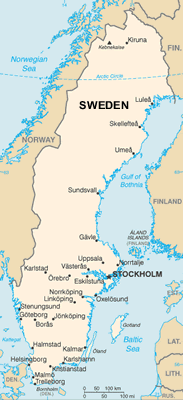
|
|
Sweden's foreign minister denied entry to Sri Lanka
, 2009 |
| SWETAM - Sweden Tamil
Website |
| TRO, Sweden |
| Maveerar Naal,
2008 |
| Maveerar Naal,
2007 |
| Swedish
Hopes for Peace Efforts in Sri Lanka,
2006 |
|
Vipesan Paramanathan wins medal at Taekwondo
Championship 2009 in Sweden |
| Sweden will not ban the
LTTE, 2003 |
|
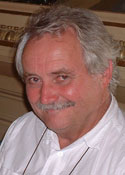
Professor Peter
Schalk,
Uppsala
University
Peter
Schalk's main fields of
research are ritual transmission of Buddhism in Sri
Lanka, the religions of Fu Nan as state ideologies,
the history of Buddhism among Tamils in Tamilakam and
Ilam, Hinduism in western exile, and the religious
expressions of social-economical conflicts in present
South Asia. He has been engaged in Tamil Studies
since the 1970s, and started his field work in Sri
Lanka in 1970. He witnessed the founding of Yalppanam
University in 1974, and has been closely connected to
the exchange programme between Uppsala University and
the University of Yalppanam (Jaffna) in Sri
Lanka.
|
| Caivam among Tamil Immigrants in
Sweden |
| Swedish University Essays about Tamil
Nadu |
|
|
Tamils - a Nation
without a State

Sweden
- சுவீடன்
- an
estimated 2000 Tamils live in Sweden -
|
|
Pongu Thamizh in Sweden - June 2008
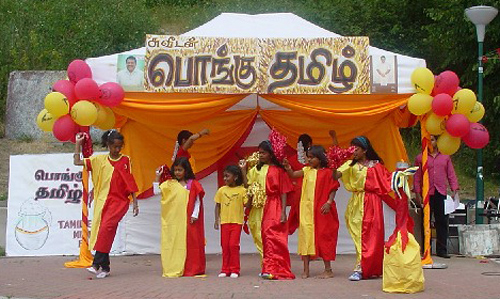
more...
|
|
Tamils in Sweden demonstrate in support of Struggle
for Tamil Eelam, 29 May 2006
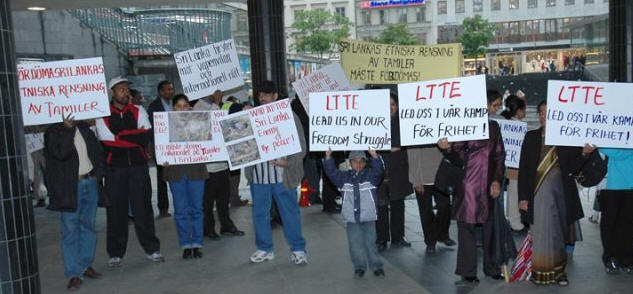
[see also Tamils demonstrate in Australia,
Canada,
France,
Germany,
Switzerland, Netherlands, Norway, Finland, Italy, South
Africa]
|
|
Maha Veerar Naal in Sweden, 27
November 2005
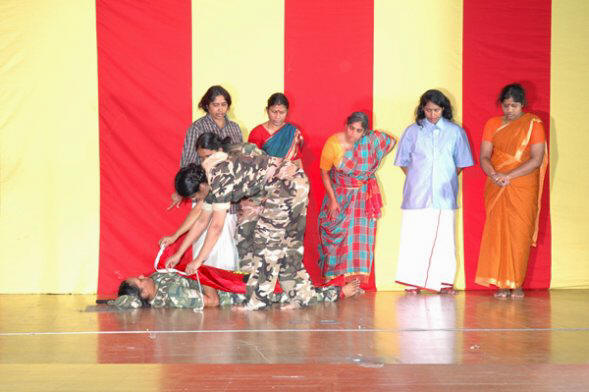
சுவீடனில்
நடைபெற்ற
மாவீரர்
நாள்
நிகழ்வின்
படத்தொகுப்பு
|
|
Maha Veerar Naaal in Sweden, 27
November 2004

சுவீடனில்
நடைபெற்ற
மாவீரர்
நாள்
நிகழ்வின்
படத்தொகுப்பு
|
 Sweden's foreign minister denied entry to Sri
Lanka as part of European cease-fire
delegation, -
Louise Nordstrom, 28 April 2009 -
Sweden's foreign minister denied entry to Sri
Lanka as part of European cease-fire
delegation, -
Louise Nordstrom, 28 April 2009 -
Associated Press writers Karl
Ritter in Stockholm, Constant Brand in Luxembourg,
Ravi Nessman in Colombo and Angela Charlton in
Paris contributed to this report.
STOCKHOLM - Sweden recalled its top diplomat in
Sri Lanka on Tuesday after Foreign Minister Carl
Bildt was blocked from joining a European
delegation pressing for a cease-fire between the
government and Tamil Tiger rebels.
Bildt had planned to visit Sri Lanka this week with
British Foreign Secretary David Miliband and French
counterpart Bernard Kouchner to appeal for an
immediate cease-fire and to call for peace talks to
end the quarter-century civil war. They got
permission to enter, but Bildt was told he was
welcome to visit in May instead.
"This is remarkable. You just don't act this way,"
Bildt told The Associated Press. He said he was not
planning to accept the invitation to visit Sri
Lanka in May.
Bildt, a former U.N. envoy to the Balkans, said he
did not receive any explanation for the decision,
which he called "not good" for relations between
Sri Lanka and Sweden. He promptly recalled the
Scandinavian country's charge d'affaires in Colombo
for consultations.
The European Union also condemned Sri Lanka's
move.
"I do think it is a grave mistake by the Sri Lankan
government which, of course, will have
repercussions in Europe and will influence further
relations between the Sri Lankan government and
European states," Czech Foreign Minister Karel
Schwarzenberg told reporters in Luxembourg.
The Czechs currently hold the EU rotating
presidency. Sweden takes over the six-month
presidency in July.
Sri Lanka's ambassador to Sweden, R.P. Jayasooriya,
denied that Bildt was refused entry. The Swede was
asked to come at a later date because only Kouchner
and Miliband were part of the scheduled visit on
Wednesday, Jayasooriya told the AP.
"There is no refusal," he said. "Colombo has a lot
of (visits by) ministers, and we cannot accommodate
them all at the same time."
He suggested Sri Lanka would not retaliate for
Sweden recalling its charge d'affaires. "There is
no such thing. We are having a very close and
cordial relationship with Sweden," he said.
In a statement, Sri Lanka's Foreign Ministry said
the government was "wrongly accused" of preventing
Bildt from visiting the country.
"It needs to be understood that in this instance
there had been no formal prior consultations with
the government of Sri Lanka with regard to the
visit of the Swedish foreign minister," the
statement said.
French Foreign Ministry spokesman Frederic
Desagneaux said Kouchner and Miliband's visit would
go ahead as planned, but added that Bildt had been
included in the original travel plans.
"We are disappointed that Carl Bildt is not able to
join David Miliband and Bernard Kouchner, as
planned," Desagneaux said.
EU foreign ministers on Monday called for a
cease-fire so the U.N. can coordinate evacuation of
civilians caught in the war zone. The Sri Lankan
government said it would immediately stop air
strikes and artillery attacks but has rejected
calls for a cease-fire.
According to the U.N., the conflict has cornered
the rebels and tens of thousands of ethnic Tamil
civilians on a small strip of land in the
northeastern part of the country, killing nearly
6,500 civilians over the last three months.
Uppsala University Professor Peter Schalk, who
specializes in Sri Lankan history, said Bildt's
visit may have been stopped as a show of discontent
with Sweden's perceived softness toward the
Liberation Tigers of Tamil Eelam, listed as a
terrorist group by the EU.
"It hasn't, like Britain and France, banned the
showing of the Tiger flag, for example," Schalk
said.
He said Sweden may also have been punished for
supporting neighboring Norway's efforts to mediate
in the conflict.
Earlier this month, Sri Lanka's government dropped
Norway as a mediator, accusing Oslo of failing to
protect its mission there from Tamil protesters.
Sri Lankan Tamil expatriates have taken to the
streets in European capitals over the past months
to protest the military offensives and to demand a
cease-fire.
|
 Swedish
Hopes for Peace Efforts in Sri Lanka Swedish
Hopes for Peace Efforts in Sri Lanka
SR International Radio - 2 August 2006
The Swedish Foreign Ministry says it still has
hopes of being part of future peace efforts in Sri
Lanka ? despite the announced withdrawal of Swedish
observers and the worsening conflict between
government forces and Tamil Tiger guerrillas.
The withdrawal is the result of Tamil Tiger demands
? following the European Union decison to classify
this as a terrorist organization.
Sweden says there is a risk that the delicate
cease-fire treaty could be endangered if EU
observers remain with the support of only one of
the fueding parties.
But the ministry says it encourages the Tamil
Tigers to reconsider its demands and that Sweden
would be ready to send back its observer team.
|
|
 Sweden will
not ban the LTTE
Sweden will
not ban the LTTE
Bandula Jayasekara in Stockholm
in the Sinhala owned Sri Lanka The Island - 3 July
2003
The Swedish government says that they would not
do anything to stop any LTTE activities in Sweden,
since it is important for them to keep contacts
with both parties in the conflict in a neutral way,
in order to promote the peace process. At an
interview with 'The Island' in Stockholm, Hans
Nicklasson, who holds the rank of minister at the
Department for Asia and the Pacific at the South
Asia Desk said that Sweden will not ban the LTTE
and his government would continue to support the
peace process in Sri Lanka. Nicklasson a senior
diplomat at the Swedish Ministry of Foreign Affairs
also attended the international donor conference
held in Tokyo last month. The interview in full
Following is a verbation report of the island
interview.
Q: What is your government's policy on Sri
Lanka?
We have had a close cooperation with Sri Lanka
since the country became a sovereign state. We
continue to support and cooperate with Sri Lanka.
We signed in early April a new agreement to
support for the next three years. That would be
about for 35 million dollars in value term. As
for the peace process that would be used
according to the progress of the peace process.
Of course if the peace process stops it would
influence very much, the use of those monies.
Q: How do you look at the LTTE activities in
Sweden? They seem to be operating some shops
here?
I am not aware of any such shops. So, I don't
see we have a policy on that. I don't see
personally why we should close them. It is a free
country even if they do exists.
Q: Any plans to ban the LTTE in Sweden?
We think it is important to keep contacts with
both parties in this conflict in a neutral way. I
don't think we will do anything to stop any LTTE
activities. Because we need the contact in order
to promote the peace process.
Q: Your government's views on the stalemate in
the Sri Lankan peace process?
Apparently the LTTE has said that they want to
go back to negotiations. We look upon it as a
very positive sign.
Q: The LTTE says that there is too much
international pressure. What are your views on
that?
I have not heard that. I think the
international pressure will be there. There is a
great risk I think if the negotiations stop or
get stalled the international interest for Sri
Lanka will go away. As you know from the
declaration in Tokyo most countries that pledged
the 4.5 billion dollars say that it is on
condition that peace negotiations go on. I think
it is a big carrot for both parties. I think it
should be a big carrot also for the LTTE because
they would probably profit more than the
government from all these pledges. Sweden will
continue to support the peace process and we are
going to support and take part in a Wilton Park
conference that is planned for September here. It
is not yet finalized and not a stable decision.
The intention is to have this conference
hopefully with the LTTE and the people from the
government of Sri Lanka. It is not yet decided
how the conference would be conducted since it
would be handled by Wilton Park and we are just
facilitating it. These conferences are
international and are normally held in England
but this time for some reason they wanted to have
it here.
Q: How do you see the role of the Sri Lanka
Monitoring Mission?
We look upon it as a positive thing because we
are part of it and we decided only a month ago
that we should increase by 50% our monitors from
8 to 12. Both parties in Sri Lanka also agree
that the SLMM is an important aid in securing the
peace.
Q: Many Sri Lankan see the Swedish as more
independent and neural than the Norwegians. So,
would you like to play a much more important role
in the monitoring mission?
I don't think that we would ask for more
influence. I think the Norwegians are doing an
excellent job and we don't have any idea of
taking over from them. They are excellent and
they should continue.
Q: What made you send a low level delegation to
the Tokyo donor conference?
It was simply because all the top-level people
were engaged in other things during the time. We
tried very much to get them go there.
Unfortunately they had other priorities at the
time.
Q: How much have you pledged to Sri Lanka and
what other support would you extend to the
island?
To start with we pledged 30 million Swedish
kronors at the Oslo conference in November for
immediate humanitarian work. Then we have this
agreement as I told you before to support during
the next three years and also through
international organizations. I cannot tell you
the total but it would be much more than that 35
million dollars.
Q: How would you monitor these funds, that it
would go to the correct hands?
It is through SIDA. They are monitoring very
closely what's happening.
Q: Newspaper reports in Stockholm say that Sri
Lanka is among 23 countries, which taps telephones
in Swedish embassies. Your comments.
Well I don't know about Sri Lanka exactly. It
is normal in most diplomatic circles that tapping
is a thing you would expect wherever you are. Sri
Lanka would probably not be an exception.
Q: But, Sri Lanka's name is mentioned in the
article?
Stories like this would go around. We have to
accept that there are phone tapping and email
tapping and whatever.
Q: Do you think that a friendly country like Sri
Lanka would want to do that at the Swedish embassy
in Colombo?
I wouldn't know that. I prefer not to comment
on that.
|
|
 Professor Peter
Schalk,
Professor Peter
Schalk,
Uppsala
University
[see also The Revival of
Martyr Cults among Ilavar - Peter Schalk, 1997
and
Resistance
and Martyrdom in the Process of State Formation of
Tamil Eelam, 1997]
Peter Schalk's main fields
of research are ritual transmission of Buddhism in
Sri Lanka, the religions of Fu Nan as state
ideologies, the history of Buddhism among Tamils in
Tamilakam and Ilam, Hinduism in western exile, and
the religious expressions of social-economical
conflicts in present South Asia. He has been
engaged in Tamil Studies since the 1970s, and
started his field work in Sri Lanka in 1970. He
witnessed the founding of Yalppanam University in
1974, and has been closely connected to the
exchange programme between Uppsala University and
the University of Yalppanam (Jaffna) in Sri Lanka.
This exchange programme was introduced in 1979
after the two VC's of the two universities signed
an agreement of exchange. Due to the civil war the
intensity decreased in the late 1990s, but it was
again resumed after the ceasefire agreement in
2001. Several researchers and also the chief
librarian of Yalppanam University have visited
Uppsala since that.
The present research interests of
Prof. Peter Schalk are:
• Buddhism among Tamils in Tamilakam and
Ilam,
• European Images of South Asians
• Religious Expressions of Martial Conflicts
in South Asia, and
• Traditional Buddhism and Hinduism in
Lanka
In recent years Peter Schalk has worked on the
following South Asia related research projects:
- A comparative study of
religious expressions in intra- and inter-state
(martial) conflicts in South Asia and Southeast
Asia, an interdisciplinary research
project within the fields of Cultural
Anthropology, Sociology, Development Studies,
History and Comparative Religion (i e History of
Religions). The overall aim of this project is to
focus on the general socio-economic and political
conditions leading to (martial) conflicts in
South Asia and Southeast Asia in relation to
religious values, value systems and ideologies,
including their transformation and
re-transformation in the course of the conflict
and reconciliation.
- Friend or foe? European
xenologies of South Asians. European
colonial xenologies focused a very specific,
fundamental and burning problem: How to cope with
cultural diversity, including religions, and all
its threatening implications? European arguments
go deeper than to contingent impressions of
liking or disliking another culture. They refer
ultimately to a positively or negatively
evaluating conceptualization of cultural
diversity per se. Schalk proposes a seemingly
very limited project to begin with, a project
that focuses Swedish relations to colonial Dutch
Ceylon in the 17th and 18th centuries. The
language competence needed for this small area
alone, colonial Ceylon, is Sanskrit, Pali,
Prakrit, Sinhala and Tamil. Many sources used for
this study, are in Portuguese, Dutch, and German.
Already at the initial stage of this project,
other European countries than Sweden are involved
in this study.
- Memory,
Ritual and Armed Resistance. Research
project about how members of the LTTE through
commemorative rituals are recruited and mobilised
to commit suicidal acts. In November 2004 Schalk
received SEK 478 000 SEK for this project as a
two-years grant (2005-06) from the Swedish
Research Council. More
information (in Swedish only).
In January 2004 Schalk published a
book called "God as Remover of Obstacles. A
Study of Caiva Soteriology among Ilam Tamil
Refugees in Stockholm, Sweden" (Acta
Universitatis Upsaliensis, Historia Religionum 23.
Uppsala: AUU, 2004). It is distributed through the
University Library Uppsala.
An International seminar on "Precept and Practice
in Asian Buddhism" was held at Uppsala University
1-6 September 2004. Participants
from China, UK, Sweden and above all Germany were
attending. The seminar was organised by
Arbeitskreis für asiatische
Religionsgeschichte, Akar (Prof. Max Deeg, Dr.
Oliver Freiberger and Dr. Christoph Kleine, in
co-operation with Uppsala University (Prof. Peter
Schalk). The papers presented will be published
next year in Acta Universitatis Upsaliensis.
In August 2004 Peter Schalk
received a SASNET
Planning grant for an educational project with
Jaffna (Yalppanam) University, called "Introduction
of Modern Research Methods and Theories within the
field of humanities in the University of
Yalppanam." Dr. Schalk was, as mentioned above,
connected to the University of Jaffna (Yalppanam)
from 1970, and involved in students and teachers
exchange. Due to the civil war in Sri Lanka Jaffna
has however been cut off from the outside World for
many years, and this is especially the case
regarding studies in humanities. The planning grant
was used by Schalk to spend time at Jaffna
University during the Winter 2004/05, to give
courses and lead seminars on all levels that
initiate a change of the prevalent weaknesses. He
also prepared the ground for Swedish students to go
to Jaffna for language courses in Tamil and for
studies in Shivaism.
The contacts at Yalppanam
University has mainly been with the Dept. of Hindu
Civilization; Dept. of Islamic and Christian
Studies; the Tamil Department (including
epigraphical Tamil); and the Dept. of History and
Archaeology.
In December 2007, Prof. Schalk
published a monograph titled "Die Lehre der Befreiungstiger Tamililams
von der Selbstvernichtung durch göttliche
Askese: Vorlage der Quelle ÜBERLEGUNGEN DES
ANFÜHRERS" about the
nationalism/patriotism of Veluppillai Pirapakaran,
leader of the LTTE, based on the collection of his
sayings known as talaivarin cintanaikal
'Reflections of the Leader', and some of his
speeches. The introduction is in German. It focuses
on the concept of tiyakam 'abandonment (of life)',
sometimes rendered as martyrdom or heroic death.
Then follows the Tamil text but transliterated.
Finally follow Schalk's complete translations of
this text into German, English, and Swedish. A
translation into Sinhala is added, produced by
Anonymous. The readers of Sinhala can now for the
first time study the authentic words of Veluppillai
Pirapakaran in their mother tongue. The work,
financed by the Swedish Research Council
(Vetenskapsrådet), has done in co-operation
with professor Alvapillai
Veluppillai. The manuscript was
closed in September 2007. The work is published as
e-book only and can be downloaded free of charge
from the database at Uppsala University chapter by
chapter. There are six. Please go to
http://publications.uu.se/abstract.xsql?dbid=8404.
Alvapillai
Veluppillai is Professor Emeritus in Tamil from
the University of Yalppanam, Sri Lanka. During the
period 1990-2000 he was connected to Uppsala
University as a researcher on Tamil literature and
religion, and he received an Honorary Doctorate
there in 1995. He is now living in America.
In the Fall 2005 Dr Pushparatnam visited Uppsala
University for six months. He is a professional
archaeologist specialising on the Tamil area in
South India and Ilam (Lanka), holding a senior
lecturer's post at Yalppanam University. His coming
to Uppsala was part of the exchange programme
between Uppsala and Yalppnam that started in 1989.
In Uppsala, he is worked together also with the
Dept. of
Archaeology, where a team of young
archaeologists from the island already works. The
task of Dr Pushparatnam has been to document the
earliest religious artefacts found by him during
two decades of excavations in the Tamil area of
Ilam. His work will be a contribution to our
knowledge about the earliest forms of Tamil Caivam
(Sivaism) and Tamil Pauttam (Buddhism) in Ilam.
|
|